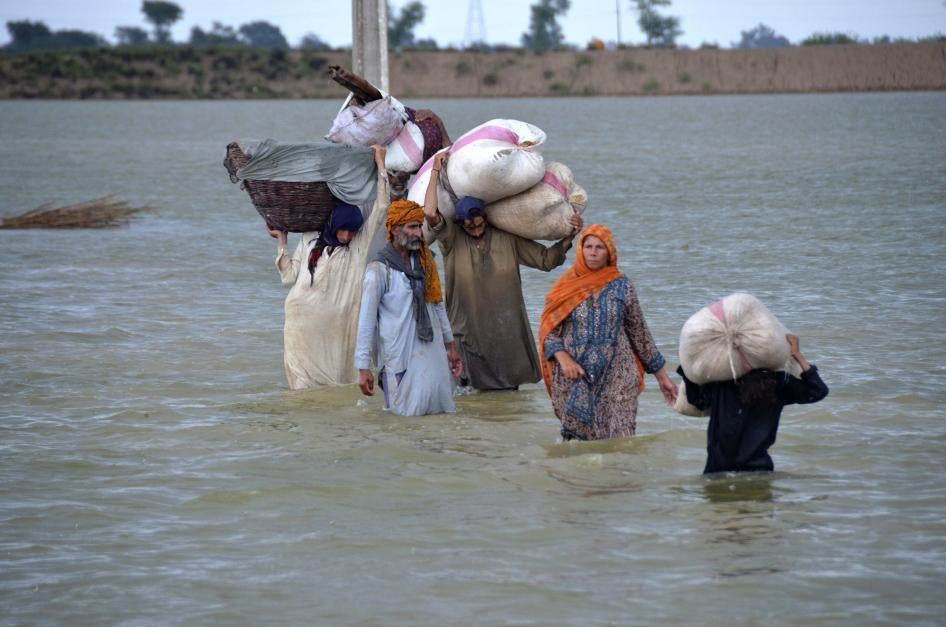(Jakarta) – Pakistani authorities intensified their clampdown on media, civil society groups, and opposition activists in 2022, while failing to protect the rights of minorities and other at-risk groups, Human Rights Watch said today in its World Report 2023. Devastating floods that affected one-third of the country had the greatest impact on the poor, who were already reeling from a deepening economic crisis with skyrocketing food and fuel prices.
“The space for free expression and dissent in Pakistan is rapidly shrinking,” said Patricia Gossman, associate Asia director at Human Rights Watch. “Pakistan’s politicians are locked in a power struggle in which a free media and vibrant civil society are the casualties.”
In the 712-page World Report 2023, its 33rd edition, Human Rights Watch reviews human rights practices in close to 100 countries. In her introductory essay, acting Executive Director Tirana Hassan says that in a world in which power has shifted, it is no longer possible to rely on a small group of mostly Global North governments to defend human rights. The world’s mobilization around Russia’s war in Ukraine reminds us of the extraordinary potential when governments realize their human rights obligations on a global scale. The responsibility is on individual countries, big and small, to apply a human rights framework to their policies, and then work together to protect and promote human rights.
Pakistani authorities harassed and at times prosecuted human rights defenders and journalists for criticizing government policies. Violent attacks on members of the media increased. The authorities used blasphemy accusations and an overbroad, colonial-era sedition law against political opponents and journalists.
Shahbaz Gill, a senior official with the opposition party Pakistan Tehrik-i-Insaf (PTI) headed by former prime minister Imran Khan, was arrested in Islamabad on August 9 on charges of sedition and incitement to mutiny after criticizing the military in a TV interview. Activists linked to Pakistan Tehrik-i-Insaf made rape threats against Gharida Farooqi, a well-known television journalist. In August, Waqar Satti, a journalist, faced blasphemy charges for a video he posted on Twitter containing quotes from Imran Khan.
The Pakistani government failed to amend or repeal blasphemy law provisions that provide a pretext for violence against religious minorities, as well as arbitrary arrests and prosecution. Members of the Ahmadiyya religious community are a major target for prosecution under blasphemy laws, as well as specific anti-Ahmadi laws. In January an anti-cybercrime court sentenced Aneeqa Atiq to death because she shared “blasphemous content” on WhatsApp. In February in Khanewal, Punjab, a mob stoned to death Mushtaq Ahmed, who had been diagnosed with a mental disorder, for allegedly desecrating the Quran.
The floods in Pakistan in 2022 killed over 1,500 people, displaced more than 33 million, and caused billions of dollars in damage to homes and critical infrastructure. Pakistan is among the countries most vulnerable to climate change. It faces rates of warming considerably above the global average and is projected to experience more extreme rainfall that could increase the risk of further flooding. The Pakistani government sought global assistance and with other countries successfully urged governments in the Global North to agree to create a compensation fund at the climate summit COP27. But it did not sufficiently prepare and take remedial measures to address its own underlying vulnerabilities.
Floods exacerbated longstanding health inequities for women and children. Of 650,000 pregnant women and girls affected by the floods, 73,000 had to give birth in unsafe conditions, worsening the impact of Pakistan’s poor record on protecting maternal health. More than 400 children were killed in the floods, and many more injured. UNICEF reported that in the immediate aftermath of the floods at least 3.4 million children needed urgent humanitarian assistance and were at an increased risk of waterborne diseases, drowning, and malnutrition. As of August, approximately 16 million affected children lacked housing and access to safe drinking water.








